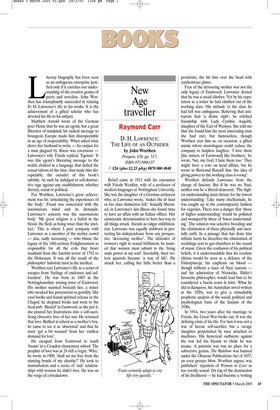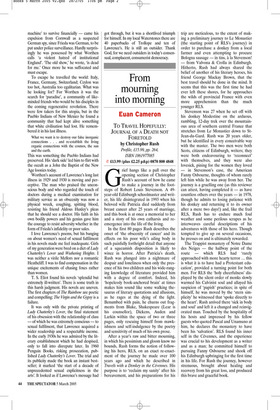New Age traveller
Raymond Carr
D. H. LAWRENCE: THE LIFE OF AN OUTSIDER by John Worthen Penguin, £30, pp. 517, ISBN 0713996137 ✆ £26 (plus £2.25 p&p) 0870 800 4848 Literary biography has been seen as an ambiguous enterprise justified only if it enriches our understanding of the creative genius of poets and novelists. John Worthen has triumphantly succeeded in relating D. H. Lawrence’s life to his works. It is the achievement of a gifted scholar who has devoted his life to his subject.
Matthew Arnold wrote of the German poet Heine that he was an egoist, but a great liberator of mankind; his radical message to bourgeois Europe made him disrespectable in an age of respectability. When asked what drove her husband to write — his output for a man plagued by illness was enormous — Lawrence’s wife Frieda replied, ‘Egoism.’ It was this egoist’s liberating message to the world, clothed in a language that defied the sexual taboos of the time, that made him disreputable, the outsider of this book’s subtitle. As such he indulged in self-destructive rage against any establishment, whether literary, social or political.
For Worthen, Lawrence’s great achievement was his ‘articulating the experiences of the body’. Freud was concerned with the unconscious mind and its demands. Lawrence’s concern was the unconscious body. ‘My great religion is a belief in the blood, the flesh as being wiser than the intellect.’ This is where I part company with Lawrence as a member of the motley crowd — alas, sadly increasing — who blame the legacy of the 18th-century Enlightenment as responsible for all the evils that beset mankind from the Jacobin terror of 1792 to the Holocaust. It was all the result of the philosophes’ hubristic trust in the intellect.
Worthen sees Lawrence’s life as a series of escapes from ‘feelings of enclosure and suffocation’. He was born in 1885 in the Nottinghamshire mining town of Eastwood. His mother married beneath her, a miner who mocked her pretensions to gentility. She read books and found spiritual release in the Chapel; he despised books and went to the local pub. ‘Buried’ in Eastwood, as she put it, she poured her frustrations into a self-sacrificing obsessive love of her son. He returned that love. Bullied at school as a mother’s boy, he came to see it as ‘abnormal’ and that he must ‘get a bit weaned’ from her ‘endless demand for love’.
He escaped from Eastwood to teach ‘beasts’ in a Croydon elementary school. The prophet of love was at 24 still a virgin. ‘Who,’ he wrote in 1909, ‘shall set me free from the stunting bonds of my chastity?’ He took to masturbation and a series of ‘sick’ relationships with women he didn’t love. He was on the verge of a breakdown. Relief came in 1912 with his encounter with Frieda Weekley, wife of a professor of modern languages at Nottingham University. She was the daughter of a German aristocrat who, as Lawrence wrote, ‘makes the de haut en bas class distinction felt’. Sexually liberated, in Lawrence’s last illness she found time to have an affair with an Italian officer. Her aristocratic determination to have her way in all things struck friends as vulgar exhibitionism. Lawrence was equally stubborn in protecting his independence from any prospective ‘devouring mother’. The defender of women’s right to sexual fulfilment, he insisted that women must submit to the ‘living male power in my soul’. Inevitably, their violent quarrels became ‘a way of life’. He struck her, calling her little better than a prostitute; she hit him over the head with earthenware plates.
Fear of the devouring mother was not the only legacy of Eastwood. Lawrence denied that he was a social climber. Yet by his reputation as a writer he had climbed out of the working class. His attitude to the class he had left was ambiguous. Believing that aristocrats had ‘a divine right’, he relished friendship with Lady Cynthia Asquith, daughter of the Earl of Wemyss. She told me that she found him the most interesting man she had met, but humourless, though Worthen sees him as, on occasion, a gifted mimic whose monologues could reduce the company to helpless laughter. ‘I love them [the miners of Eastwood] like brothers,’ he wrote, ‘but, my God, I hate them too.’ They might have a vote on local affairs, but he wrote to Bertrand Russell that ‘the idea of giving power to the working class is wrong’.
Worthen defends Lawrence from the charge of fascism. But if he was no Nazi, neither was he a liberal democrat. ‘The highest understanding must dictate for the lowest understanding.’ Like many intellectuals, he was caught up in the contemporary fashion for eugenics. There was a danger that ‘those of higher understanding’ would be polluted and swamped by those of ‘lower understanding’. The solution was selective breeding and the elimination of those physically and mentally unfit. In a passage that has done him infinite harm he describes the elimination of weaklings sent to gas chambers to the sound of music. Given the confusion of his political beliefs, it is understandable that his resolute elitism would be seen as a defence of the Führerprincip; his emphasis on blood though without a trace of Nazi rascism and his admiration of Nietzsche, Hitler’s favourite philosopher, would lead him to be considered a fascist avant la lettre. What he did in Kangaroo, his Australian novel written in the 1920s, was to give a remarkably prophetic analysis of the social, political and psychological basis of the fascism of the 1930s.
In 1914, two years after his marriage to Frieda, the Great War broke out. It was the defining crisis of his life. For him it was not a war of heroic self-sacrifice but a savage slaughter perpetrated by men attached to machines. His hysterical outbursts against the war led his friends to think he was insane. A patriotic war was no place for a subversive genius. The Rainbow was banned under the Obscene Publications Act of 1857; an even greater blow, Worthen argues, was publishers’ rejection of Women in Love as too overtly sexual. On top of the destruction of his livelihood — he had become a ‘writing machine’ to survive financially — came his expulsion from Cornwall as a suspected German spy, since Frieda was German, to be put under police surveillance. Hardly surprisingly he was possessed by what Worthen calls ‘a violent hatred of institutional England’. ‘The old show,’ he wrote, ‘is dead for me.’ Once more he was suffocated and must escape.
To escape he travelled the world: Italy, France, Germany, Switzerland; Ceylon was too hot, Australia too egalitarian. What was he looking for? For Worthen it was the search for ‘paradise’, a community of likeminded friends who would be his disciples in the coming regenerative revolution. There were few takers for this utopia, but in the Pueblo Indians of New Mexico he found a community that had kept alive something that white civilisation had lost. He remembered it in his last illness.
What we want is to destroy our false inorganic connections . . . and re-establish the living organic connections with the cosmos, the sun and the earth.
This was something the Pueblo Indians had preserved. His ‘dark side’ led him to flirt with the occult as a John the Baptist of the New Age loonies today.
Worthen’s account of Lawrence’s long last illness in 1929 and 1930 is moving and perceptive. The man who praised the unconscious body and who regarded the touch of doctors during a medical examination for military service as an obscenity was now a physical wreck, coughing, spitting blood, resisting his friend Aldous Huxley’s pleas that he should see a doctor. His faith in his own bodily powers and his genius gave him the courage to resist adversity whether in the form of Frieda’s infidelity or poor sales.
I love Lawrence’s poems, but his banging on about women’s need of sexual fulfilment in his novels made me feel inadequate. Girls of my generation were bred on a diet of Lady Chatterley’s Lover and Wuthering Heights. I was neither a virile Mellors nor a romantic Heathcliff. I was to find compensation in the unique excitements of chasing foxes rather than women.
T. S. Eliot found his novels ‘splendid but extremely ill-written’. There is some truth in this harsh judgment. His novels are uneven. The first chapters of The Rainbow are poetic and compelling; The Virgin and the Gypsy is a failure.
It was only with the private printing of Lady Chatterley’s Lover, the final statement of his obsession with the relationship of class — of which he was extremely conscious — to sexual fulfilment, that Lawrence acquired a wider readership and a respectable income. In the early 1930s he was admired by the literary establishment which he had despised, only to fall into disrepute later. In 1960 Penguin Books, risking prosecution, published Lady Chatterley’s Lover. The trial and its publicity made the book an instant bestseller; it marked ‘the start of a decade of unprecedented sexual explicitness in the arts’. It looked as if Lawrence’s message had got through, but it was a shortlived triumph for himself. In my local Waterstones there are 40 paperbacks of Trollope and ten of Lawrence’s. He is still an outsider. Thank God, for we need outsiders in today’s consensual, complacent, consumerist democracy.



























































 Previous page
Previous page